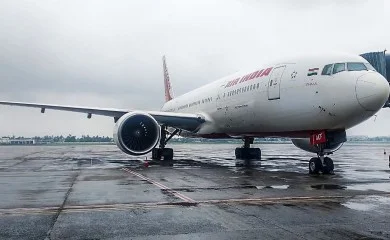Air India Refutes Claims Over Boeing 787 Door Glitch, Says Terminated Crew Gave False Statements
New Delhi | Air India on Friday strongly refuted allegations that two senior cabin crew members were terminated for reporting a technical fault in a Boeing 787 Dreamliner last year. Responding to a recent media report and union criticism, the airline said the dismissals were based on “misconduct, behavior, and continued falsification of critical information during an official investigation.”
The incident in question took place on May 14, 2024, during Flight AI-129 from Mumbai to London, when an emergency slide raft deployed after landing at Heathrow Airport. This deployment, according to standard aviation protocols, only occurs when the door is in armed (automatic) mode, not manual.
Airline Denies Suppressing Technical Glitch Report
A report earlier this week claimed that the two dismissed crew members had refused to alter their statements, which originally acknowledged a technical malfunction. The report triggered widespread concern over aviation safety and calls for a CBI probe by the Aviation Industry Employees’ Guild (AIEG).
However, Air India in its official response to IANS denied any wrongdoing, clarifying that the emergency slide deployment occurred because the door was in armed mode, not due to any system error.
“It was clear in the investigation that the slide could not have been activated unless the door was in armed mode. This was corroborated by relevant data, images, video evidence, and third-party experts,” Air India stated.
“Multiple Opportunities Were Given,” Says Air India
Air India emphasized that the two now-former crew members were given “multiple fair opportunities” to revise their statements—believed to have been made inadvertently during the early stages of inquiry.
“They continued to falsify critical information during the course of the investigation, despite evidence to the contrary,” the airline said.
In a pointed statement, the airline also criticized the former employees for "using the tragedy of AI171 to repeat their falsehoods,” referring to the recent Ahmedabad crash involving flight AI171, which has brought airline safety issues back into the national spotlight.
Background: What Happened on May 14, 2024?
Flight AI-129, a Boeing 787 Dreamliner operating between Mumbai and London, had completed its journey when the slide raft unexpectedly deployed as the aircraft was being disarmed at the gate. According to the now-dismissed crew, the door was in manual mode, raising suspicions of a technical fault in the door system.
In aviation terms, slide rafts are activated only when the door is in “armed” mode, meant for emergencies. If they deployed while in “manual,” it could indicate a serious mechanical or system failure.
However, Air India’s investigation—with inputs from independent aviation experts—ruled out any technical malfunction, pointing instead to procedural error and failure to disarm the door.
Civil Aviation Ministry Responds: No Decision Yet on AI171 Data Recorders
Amid rising scrutiny, the Ministry of Civil Aviation also released a statement clarifying that no final decision has been made about sending the Cockpit Voice Recorder (CVR) or Digital Flight Data Recorder (DFDR) of the AI171 crash abroad for analysis.
“We urge all stakeholders to refrain from speculation on such sensitive matters and to allow the investigative process to proceed with the seriousness and professionalism it warrants,” the ministry said.
Guild Demands Independent Investigation
Earlier this week, AIEG General Secretary George Abraham called for a CBI probe into the dismissals, claiming that the crew was punished for refusing to retract statements on the Dreamliner fault. The guild also submitted a letter to Prime Minister Narendra Modi seeking intervention.
Abraham alleged that the case had gone unresolved for over eight months and claimed that the Directorate General of Civil Aviation (DGCA) had only conducted an “informal investigation.”
However, with Air India now publicly refuting these claims and backing its findings with technical documentation, the focus may shift to how regulators handle similar future complaints and crew grievances.
As the aviation sector in India continues to expand rapidly, incidents like these place a spotlight on the need for transparent investigations, protection of whistleblowers, and adherence to global safety standards.
While the dismissed crew’s allegations have stirred debate, Air India’s firm denial—backed by evidence and external validation—adds complexity to the narrative. With regulatory bodies yet to make their final observations, this story continues to develop.
Stay tuned to TheTrendingPeople.com for exclusive updates on AI129, AI171, and aviation safety developments across India.

